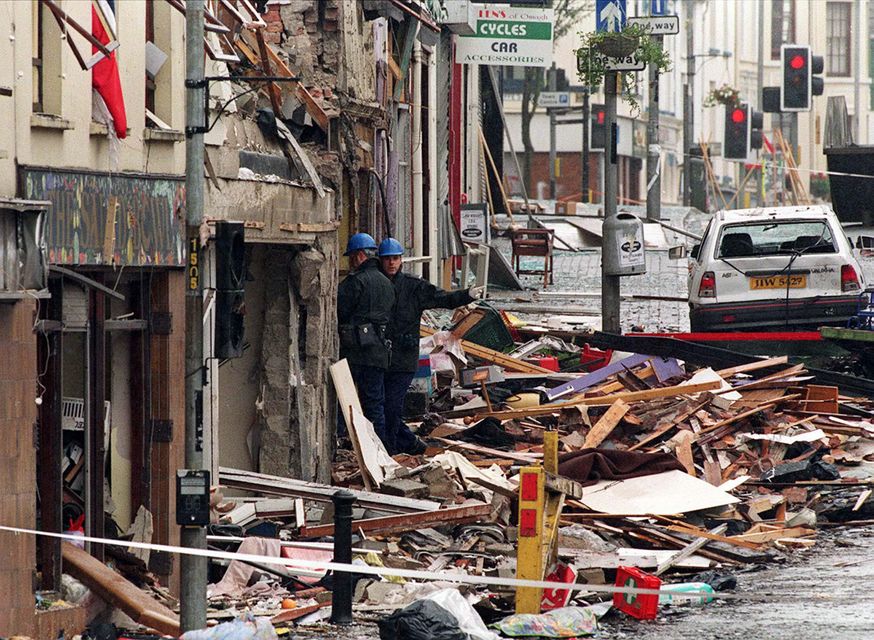The daughter of a woman killed in the Omagh bomb has said their family has faced a “wall of silence” in their search for answers.
Elizabeth Rush (57) – known as Libby – had been working in her craft shop on August 15, 1998, when the Real IRA bomb exploded, killing 29 people, including a mother carrying unborn twins.
Libby’s daughter Siobhan O’Neill read a statement to the inquiry on Thursday on behalf of her and her brothers.
She said her mother was “widely known” throughout Omagh.
“She had a shop on Market Street, the scene of the bombing, for 27 years,” said Siobhan.
“The premises used to be a coffee shop, however, over the years preceding the bomb, it was closed and the premises converted to a gift shop selling pine furniture and giftware.
“In the years leading up to the bombing, our mother developed an interest in craftwork and needlework, making cushions and soft furnishings which she sold at the premises.
“Throughout the years, she ran the shop as a coffee shop She made numerous good friends and became well known as a good listener, with people often calling in to talk over their troubles with her and seek advice.
“The hospital was in chaos with blood everywhere, children crying and bodies burned, lying in the corner.”
“She was widely known throughout the area for her discretion and gentle nature.
“This was a simple, quiet and peaceful normal family life of a woman, a mother and her family that was destroyed.
“Libby did not recognise her potential as a talented and creative individual. Our mother did not have her opportunity to shine.”
Libby’s husband Lawrence threw himself into campaigning following the blast, challenging the police and UK Government.
Siobhan described how the family’s quest for answers about the bombing were often frustrated.
“In the aftermath, our family reflected on previous events leading up to the attack,” she said.
“Why was our mother taken away from us in this brutal attack? With this in mind, our father decided to seek answers regardless of the consequences.
“Sadly, in the oncoming months and years, we were met with a wall of silence. Our father was unable to stay silent because he knew silence was a lie.
“He demanded accountability and transparency. His confrontational approach was met with disapproval and ridicule.
“Politicians, the security forces and the community avoided the conversations, not acknowledging the effect on victims’ families.
“Undeterred, Lawrence relentlessly confronted all. Why? He loved living. He loved his wife, the mother of his children, and his soulmate.”
The aftermath of the Omagh bomb
Siobhan recalled the carnage she witnessed as she arrived in Omagh on the bus.
“I was due to come down from Belfast and travelled with my partner, now husband, on the bus from Belfast to Derry via Omagh,” she said.
“When the bus arrived at the traffic lights, near the centre of Omagh, at approximately 3.20pm, it was a scene of complete carnage.
“The bus turned, taking an alternative route to the depot. En route, it was apparent evil was in the air.
“Women and children in fancy dress – a parade was scheduled at 3pm – were crying and distressed.
“I ran from the depot, concerned about my mother. A policeman with blood on his shirt recognised me and directed me to the hospital. The hospital was in chaos with blood everywhere, children crying and bodies burned, lying in the corner.
“Confusion and fear filled the air like the apocalypse. As each moment passed, I feared my mother may not have survived, but continued to look for her, alive or dead.”
The family’s worst fears were confirmed on the Sunday evening when news of Libby’s death was relayed to them.
Siobhan told the inquiry of the hopeful feeling the Good Friday Agreement had brought in 1998.
“We looked forward to this new chapter in our nation and our own personal family life. This transitional period in all our lives was full of hope and anticipation,” she said.
“We are a community that is divided, yet divisions do not exist in the real world. We would cease to function without resilience, dedication and co-operation with one another.
“We as human beings are capable of so much more when we have an open heart, are loving, caring and treat each other with kindness and respect.
“It was on August 15, 1998, despite the suffering and pain, despite all of this, in the moments and hours after the explosion, we found there were no boundaries.
“Our need to comfort, assist, love and caress each other was how we all survived (after) that day.”
